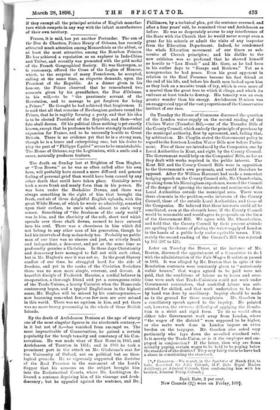Later on Tuesday the House, at the instance of Mr.
Buxton, discussed the appointment of a Committee to de; 1 with the administration of the Fair-Wages Resolution passed in 1891. It was alleged by Mr. Buxton that in spite of the Resolution contracts were constantly given to "notoriously unfair houses," that wages agreed to be paid were not paid, that the conditions of labour as to hours and over- time were such that Trade-Unionists could not work under Government contractors, that unskilled labour was sub- stituted for skilled, and that work undertaken to be done by hand was done by machinery. Inquiry should be made as to the ground for these complaints. Mr. Goschen in a conciliatory speech agreed to the inquiry. He pointed out, however, the extreme difficulLy of applying the Resolu- tion in a strict and rigid form. To do so would often either take Government work away from London, where "the wages of the district" were supposed to be higher, or else make work done in London impose an extra burden on the taxpayer. Mr. Goschen also asked very pertinently who lays down the so-called standard rate. Is it merely the Trade-Union, or is it the employer and em- ployed in conjunction P If the latter, then why are firms actually paying certain wages to be held to be paying below the standard of the district? They may fairly claim to have had a share in constituting the standerd.






































 Previous page
Previous page